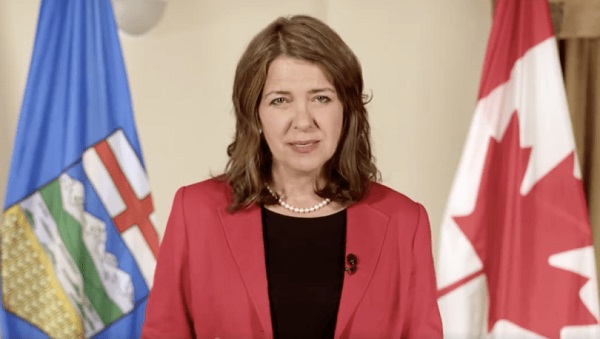Alberta
Alberta introduces bill banning sex reassignment surgery on minors

From LifeSiteNews
Alberta Conservative Premier Danielle Smith followed through on a promised bill banning so-called ‘top and bottom’ surgeries for minors.
Alberta Conservative Premier Danielle Smith made good on her promise to protect kids from extreme transgender ideology after introducing a bill banning so-called “top and bottom” surgeries for minors.
“It is so important that all youth can enter adulthood equipped to make adult decisions. In order to do that, we need to preserve their ability to make those decisions, and that’s what we’re doing,” Smith said in a press release.
“The changes we’re introducing are founded on compassion and science, both of which are vital for the development of youth throughout a time that can be difficult and confusing.”
Bill 26, the Health Statutes Amendment Act, 2024 “reflects the government’s commitment to build a health care system that responds to the changing needs of Albertans,” the government says.
The bill will amend the Health Act to “prohibit regulated health professionals from performing sex reassignment surgeries on minors.”
It will also ban the “use of puberty blockers and hormone therapies for the treatment of gender dysphoria or gender incongruence” to kids 15 and under “except for those who have already commenced treatment and would allow for minors aged 16 and 17 to choose to commence puberty blockers and hormone therapies for gender reassignment and affirmation purposes with parental, physician and psychologist approval.”
Alberta Minister of Health Adriana LaGrange, the bill’s sponsor, said the province’s legislative priorities include “implementing policy changes to continue our refocusing work, position our health care system to respond to pressures and public health emergencies, and to preserve choice for minors. These amendments reflect our dedication to ensuring our health care system meets the needs of every Albertan.”
Earlier this year, the United Conservative Party (UCP) provincial government under Smith announced she would introduce the strong pro-family legislation that strengthens parental rights, protecting kids from life-altering, so-called “top and bottom” surgeries as well as other extreme forms of transgender ideology.
With Smith’s UCP holding a majority in the provincial legislature, the passage of Bill 26 is almost certain.
About the proposed law, Smith said that her government believes it is “vitally important to preserve the time” kids have as a “youth.” She added that she believes this is so kids can “gain sufficient amount of knowledge, experience, and perspective so that you can fully understand who you are, who you want to be and what opportunities you may want to have as an adult before making permanent life-altering decisions related to your body.”
While Smith has done far more than predecessor Jason Kenney to satisfy social conservatives, she has been mostly soft on social issues such as abortion and has publicly expressed pro-LGBT views, telling Jordan Peterson that conservatives must embrace homosexual “couples” as “nuclear families.”
This weekend, thousands of UCP members will gather for the party’s annual general meeting, where Smith’s leadership will be voted on along with many other pro-freedom and family policy proposals from members. Smith is expected to pass her leadership review vote with a large majority.
Alberta
Big win for Alberta and Canada: Statement from Premier Smith

Premier Danielle Smith issued the following statement on the April 2, 2025 U.S. tariff announcement:
“Today was an important win for Canada and Alberta, as it appears the United States has decided to uphold the majority of the free trade agreement (CUSMA) between our two nations. It also appears this will continue to be the case until after the Canadian federal election has concluded and the newly elected Canadian government is able to renegotiate CUSMA with the U.S. administration.
“This is precisely what I have been advocating for from the U.S. administration for months.
“It means that the majority of goods sold into the United States from Canada will have no tariffs applied to them, including zero per cent tariffs on energy, minerals, agricultural products, uranium, seafood, potash and host of other Canadian goods.
“There is still work to be done, of course. Unfortunately, tariffs previously announced by the United States on Canadian automobiles, steel and aluminum have not been removed. The efforts of premiers and the federal government should therefore shift towards removing or significantly reducing these remaining tariffs as we go forward and ensuring affected workers across Canada are generously supported until the situation is resolved.
“I again call on all involved in our national advocacy efforts to focus on diplomacy and persuasion while avoiding unnecessary escalation. Clearly, this strategy has been the most effective to this point.
“As it appears the worst of this tariff dispute is behind us (though there is still work to be done), it is my sincere hope that we, as Canadians, can abandon the disastrous policies that have made Canada vulnerable to and overly dependent on the United States, fast-track national resource corridors, get out of the way of provincial resource development and turn our country into an independent economic juggernaut and energy superpower.”
Alberta
Energy sector will fuel Alberta economy and Canada’s exports for many years to come

From the Fraser Institute
By any measure, Alberta is an energy powerhouse—within Canada, but also on a global scale. In 2023, it produced 85 per cent of Canada’s oil and three-fifths of the country’s natural gas. Most of Canada’s oil reserves are in Alberta, along with a majority of natural gas reserves. Alberta is the beating heart of the Canadian energy economy. And energy, in turn, accounts for one-quarter of Canada’s international exports.
Consider some key facts about the province’s energy landscape, as noted in the Alberta Energy Regulator’s (AER) 2023 annual report. Oil and natural gas production continued to rise (on a volume basis) in 2023, on the heels of steady increases over the preceding half decade. However, the dollar value of Alberta’s oil and gas production fell in 2023, as the surging prices recorded in 2022 following Russia’s invasion of Ukraine retreated. Capital spending in the province’s energy sector reached $30 billion in 2023, making it the leading driver of private-sector investment. And completion of the Trans Mountain pipeline expansion project has opened new offshore export avenues for Canada’s oil industry and should boost Alberta’s energy production and exports going forward.
In a world striving to address climate change, Alberta’s hydrocarbon-heavy energy sector faces challenges. At some point, the world may start to consume less oil and, later, less natural gas (in absolute terms). But such “peak” consumption hasn’t arrived yet, nor does it appear imminent. While the demand for certain refined petroleum products is trending down in some advanced economies, particularly in Europe, we should take a broader global perspective when assessing energy demand and supply trends.
Looking at the worldwide picture, Goldman Sachs’ 2024 global energy forecast predicts that “oil usage will increase through 2034” thanks to strong demand in emerging markets and growing production of petrochemicals that depend on oil as the principal feedstock. Global demand for natural gas (including LNG) will also continue to increase, particularly since natural gas is the least carbon-intensive fossil fuel and more of it is being traded in the form of liquefied natural gas (LNG).
Against this backdrop, there are reasons to be optimistic about the prospects for Alberta’s energy sector, particularly if the federal government dials back some of the economically destructive energy and climate policies adopted by the last government. According to the AER’s “base case” forecast, overall energy output will expand over the next 10 years. Oilsands output is projected to grow modestly; natural gas production will also rise, in part due to greater demand for Alberta’s upstream gas from LNG operators in British Columbia.
The AER’s forecast also points to a positive trajectory for capital spending across the province’s energy sector. The agency sees annual investment rising from almost $30 billion to $40 billion by 2033. Most of this takes place in the oil and gas industry, but “emerging” energy resources and projects aimed at climate mitigation are expected to represent a bigger slice of energy-related capital spending going forward.
Like many other oil and gas producing jurisdictions, Alberta must navigate the bumpy journey to a lower-carbon future. But the world is set to remain dependent on fossil fuels for decades to come. This suggests the energy sector will continue to underpin not only the Alberta economy but also Canada’s export portfolio for the foreseeable future.
-

 International2 days ago
International2 days agoTrump’s ‘Golden Dome’ defense shield must be built now, Lt. Gen. warns
-

 Alberta2 days ago
Alberta2 days agoOwner sells gas for 80 cents per litre to show Albertans how low prices ‘could’ be
-

 2025 Federal Election1 day ago
2025 Federal Election1 day agoMORE OF THE SAME: Mark Carney Admits He Will Not Repeal the Liberal’s Bill C-69 – The ‘No Pipelines’ Bill
-

 Break The Needle1 day ago
Break The Needle1 day agoWhy psychedelic therapy is stuck in the waiting room
-

 Automotive1 day ago
Automotive1 day agoTrump Must Act to Halt the Tesla Terror Campaign
-

 2025 Federal Election1 day ago
2025 Federal Election1 day agoThree cheers for Poilievre’s alcohol tax cut
-

 Opinion2 days ago
Opinion2 days agoSome scientists advocate creating human bodies for ‘spare parts.’
-

 Alberta1 day ago
Alberta1 day agoEnergy sector will fuel Alberta economy and Canada’s exports for many years to come






